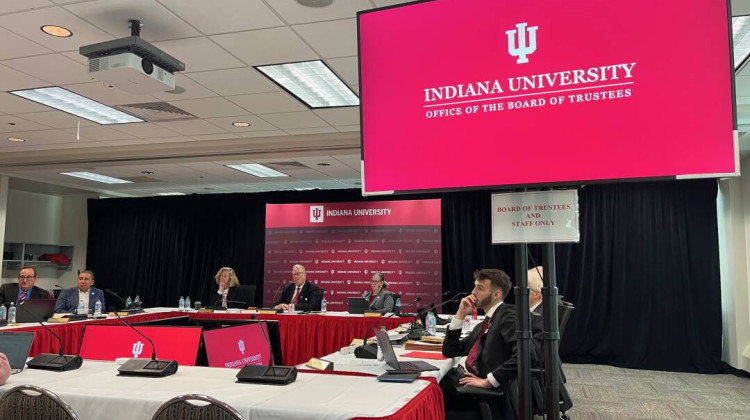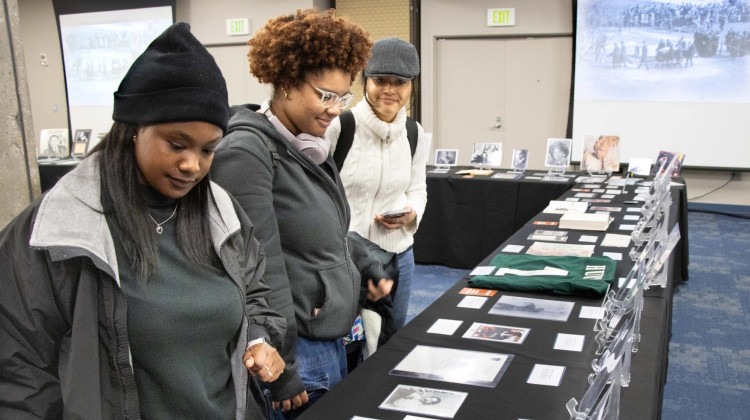
Rebecca Heger, Cathedral High School's mental health and addictions counselor, looks at 2-year-old Finn, a therapy dog at the school since 2015.
Eric Weddle/WFYI Public MediaSuicide remains the second-leading cause of death for Hoosier teens and young adults in 2014 and 2015, according to a just released report.
Among a majority of states, Indiana ranks second for high schoolers who made a suicide plan and third for those who have seriously considered suicide.
In 2014 there were 52 suicides among youth ages 10-19. In 2015 the deaths increased to 55, according to state data.
Those jarring statics and regular news reports of students taking their own lives have lawmakers, school leaders and mental health experts looking for ways to prevent another death.
At the Statehouse, two different suicide prevention proposals have garnered universal support this session — yet it remains to be seen how the House and Senate will compromise their unique plans.
As policymakers debate statewide fixes, Cathedral High School in Indianapolis has already made mental health a focus.
It’s an effort partly born out of tragedies in fall 2014. That’s when a Cathedral student took his own life. A few weeks later, another did the same.
“I think that’s what really kind of rocked our souls a bit,” Dave Worland, Cathedral principal for 17 years, said about the second death. “This is something that could happen every day, could happen twice a year. And it did here.”
But the deaths spurred new training and more openness about mental health issues at the private Catholic school. Now all staff are trained to use a technique called QPR, or question, persuade and refer.
The training shows how to recognize the warning signs of suicide, how to offer hope and seek help.
Another new program is Cathedral 360 — it connects each of the 1,200 students with a school counselor, a college counselor and an academic advisor. Worland hopes this too can help break through disguises some students use to hide emotional and mental health challenges.
“When you walk through halls of schools and you might look at kids and you’ll think, ‘Boy they’re perfectly normal and everything’s going great and they’re doing wonderful,’” he said. “But just because they’re smiling and just because they have good hygiene and just because they seem to be calm that doesn’t mean inside they are.”
Dog Helper
When Cathedral students want to talk with someone or are in crisis, they go see Rebecca Pavlick-Heger, or her four-legged friend.
Finn, a 2-year-old brown labradoodle, shares an office with the clinical mental health and addiction counselor. The trained therapy dog was donated to the school in 2015.
“Kids will literally just stroke him as he goes down the hall,” Pavlick-Heger said. “There’s just something about a dog who will accept you no matter what your day has been like.”
The two are part of the Catholic school’s robust student wellness and mental health services, that also includes three other counselors trained in academic guidance in addition to behavioral and emotional issues.
Pavlick-Heger, a former Cathedral teacher, says educators and coaches are often at the front line of identifying a student’s stress or depression. Yet teachers have to adjust to the ever changing climate of a modern high school where social media can instantly disrupt relationships and increase anxieties.
“Adolescents in themselves have not changed,” she said. “But everything around them has and they’re having a hard time keeping up with that.”
Suicide Data Points
Teen suicide continues to be a concern in Indiana, according to the 2017 Kids Count in Indiana Data Book from the Indiana Youth Institute. It’s part of a nationwide effort, sponsored by the Annie E. Casey Foundation, to study the well being of children.
Tami Silverman, the group’s president, says Indiana ranks higher than the national average in four categories related to teen suicide.
A study of 37 states, cited by the Kids Count report, found Indiana to rank third for high schoolers who seriously considered suicide (19.8 percent); second for those who made a suicide plan (17.0 percent); 10th for students who attempted suicide (9.9 percent); and ninth for high schoolers whose suicide attempts required professional medical attention.
Silverman says there’s no single cause, but the largest is depression and particularly undiagnosed depression. That can be brought on by a slew of issues impacting teens and young adults, from homelessness to bullying and cyberbullying or a parent’s job loss.
“So really the data is the starting point for the conversations for now what do we do and how do we work together to address these issues?,” Silverman said.
At the Statehouse — lawmakers are trying to do just that.
Lawmakers Want Prevention Plan
Debate is ongoing for two bills that have received unanimous support in their originating chambers.
House Bill 1430 would require school employees working with students in 7th to 12th grade to have at least two hours of suicide prevention training every other year.
Senate Bill 506 doesn’t require training but calls for a statewide suicide prevention coordinator to create programing. That person would then be charged with figuring out which professions would be required to have suicide prevention training.
Both bills have moved to the other chamber for further debate and approval before the session ends April 29.
Mindi Goodpaster — a director at Marion County Commission on Youth — supports the Senate bill. She told a Senate committee, schools can’t bear the burden of preventing suicides.
“But looking at the community as a whole and how we all come together to support youth because youth taking their own lives is one of the saddest tragedies,” she said. “It is completely preventable and we need to do more.”
At Cathedral high school, mental health counselor Heger and her principal are glad lawmakers are paying attention to the issue.
Heger said she’s knows the school’s focus on mental health has already made an impact.
“Now when we call a parent to say, ‘You know we’re questioning, we think your child may be depressed,’ a parent is listening,” she said. “Parents have really taken the message to heart.”
The Senate Education and Workforce Committee will hear HB 1430 Wednesday.
Contact WFYI education reporter Eric Weddle at eweddle@wfyi.org or call (317) 614-0470. Follow on Twitter: @ericweddle.
 DONATE
DONATE








 Support WFYI. We can't do it without you.
Support WFYI. We can't do it without you.